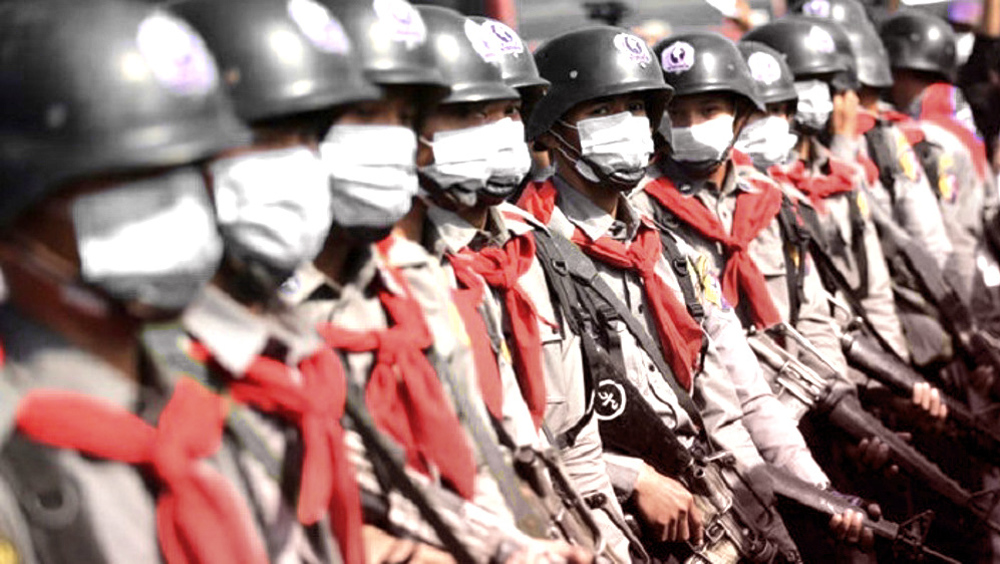Myanmar military pledges new election as thousands join anti-coup protests
Myanmar’s ruling junta has pledged to hold a new election and hand power to the winner as tensions continue to simmer in the Southeast Asian country amid growing opposition to last week’s military coup that ousted de facto leader Aung San Suu Kyi.
Myanmar’s Commander-in-Chief Senior-General Min Aung Hlaing made the remarks during his first televised address on Monday, since the military takeover of the elected government, stressing that the junta would form a "true and disciplined democracy" different to previous eras of military rule.
"We will have a multiparty election and we will hand the power to the one who wins in that election, according to the rules of democracy", he said.
General Min Aung further reiterated the army’s previous position that the reason for the takeover was the government’s failure to act on the military’s claims of voter fraud in last November’s election and its failure to postpone the election because of the coronavirus crisis.
He did not say when the next election would be held.
Anti-coup protest on streets of Myanmar
The latest development comes as thousands of people have gathered on a highway in the capital Naypyidaw, chanting anti-coup slogans, with police using water cannon against protesters in the tightly-controlled capital.
Protests also took place in the commercial capital Yangon, with saffron-robed monks marching in the vanguard of demonstrations, along with workers and students in an outburst of anger towards the military junta’s coup and the detention of civilian leaders.
Flashing a three-finger salute that they adopted from anti-government demonstrators in neighboring Thailand, the protesters were chanting "Down with military dictatorship."
They were also carrying signs reading "Release Our Leaders, Respect Our Votes, Reject Military Coup" and "Save democracy."
The junta also declared martial law in parts of Mandalay, the country’s second-largest city, after hundreds of thousands of people demonstrated nationwide against the recent coup.
The partial martial law was imposed on at least seven townships in Mandalay on Monday, forbidding people from protesting or gathering in groups of more than five.
Calls to join protests and to back a campaign of civil disobedience have grown louder and more organized since last Monday’s coup, which drew widespread international condemnation.
On February 1, the junta detained Myanmar's de facto leader and President Win Myint as well as other senior figures from the ruling party, claiming irregularities in the November election that saw Suu Kyi's National League for Democracy (NLD) party win a majority of seats.
The military handed power to General Min Aung Hlaing and imposed a state of emergency for a year.
The military also disrupted internet and telephone connections the same day.
Suu Kyi was charged last Wednesday for illegally importing communications equipment. Security forces claimed walkie-talkie radios had been found in a search of her home in the capital, Naypyidaw.
The military has said it would take control of the country for one year.
Tensions grew after General Min Aung delivered a speech warning that Myanmar’s constitution could be “revoked” if it was not respected.
Suu Kyi, who won a Nobel Peace Prize 30 years ago, faces international scrutiny for her support for a military crackdown against Rohingya Muslims in the western state of Rakhine.
She defended the military's atrocities against the Rohingya people at the UN’s top court in The Hague in December 2019.
Human rights advocates fear that the coup will worsen the plight of persecuted ethnic and religious minorities, especially Rohingya Muslims.
United Nations Secretary General Antonio Guterres has also pledged to increase international pressure on Myanmar to ensure the failure of the coup.
Myanmar was ruled by the military from 1962 until 2011, when Suu Kyi ended the junta rule.
VIDEO | Australians rally for Gaza ahead of Christmas festivities
VIDEO | Attacks on Sana'a
Iran reports further drop in annual inflation rate in December
Israel indicts two settlers over suspected spying for Hezbollah
Iran: US airstrikes on Yemen war crimes, violation of international law
Yemeni armed forces down F-18 fighter jet, repel US-UK attack: Spokesman
Iran warns against US-Israeli plot to weaken Muslims, dominate region
VIDEO | Public uproar in US against Israeli regime
















 This makes it easy to access the Press TV website
This makes it easy to access the Press TV website